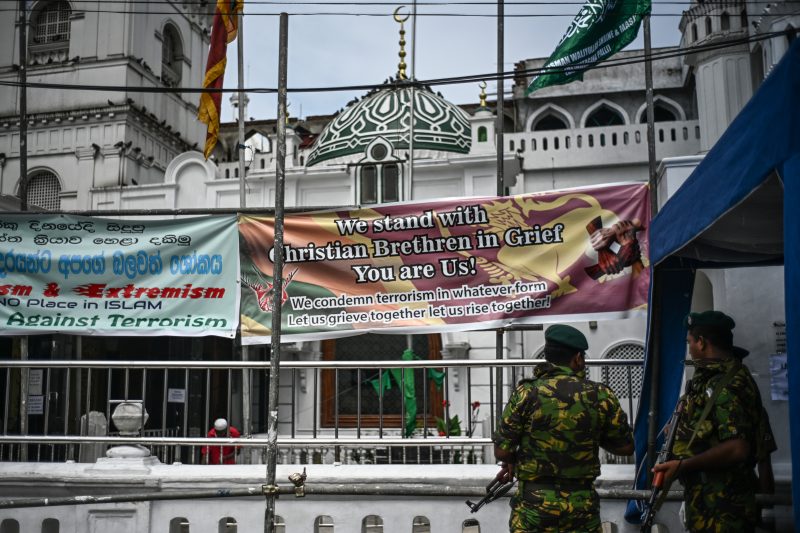Sri Lanka says radical leader killed in suicide hotel attack
Soldiers stand guard outside a mosque ahead of Friday noon prayers in Colombo as many Muslims fear retaliation for the Easter Sunday attacks (Jewel SAMAD)
Colombo (AFP) – An extremist leader at the heart of Sri Lanka’s Easter suicide bombings died in the attacks, the country’s president said Friday as security forces guarded mosques for weekly prayers amid fears of reprisal strikes.
While security forces stepped up a hunt for followers of the Islamic State group, Sri Lanka’s police chief resigned over the intelligence failures exposed by the attacks on three churches and three hotels which left 253 dead.
The government also revealed that the attacks could see tourist arrivals drop by up to 30 percent, with losses of $1.5 billion this year in critical tourism revenues.
President Maithripala Sirisena told reporters that Zahran Hashim, head of a local extremist group, was one of two attackers killed at one of the Colombo luxury hotels hit on Sunday.
“What intelligence agencies have told me is that Zahran was killed during the Shangri-La attack,” he said.
Hashim was accompanied by a second bomber identified as Ilham Ibrahim in the attack, the president said.
Authorities had been desperately searching for for Hashim after naming his group, National Thowheeth Jama’ath, as perpetrators of the attack.
DNA tests on a severed head found in the hotel turned out to be from Hashim, officials said.
Hashim, who founded the NTJ, appeared in a video released by the Islamic State group when it claimed the strikes. He is seen leading seven others in a pledge of allegiance to the IS chief.
– Radicals hunted –
With the country on the defensive over ignored foreign warnings that attacks were likely, police chief Pujith Jayasundara became the second major resignation.
Sri Lanka’s top defence ministry official Hemasiri Fernando stepped down late Thursday.
Sirisena had called on both to leave their posts because of the recriminations over the government’s failure to prevent the attacks despite the warnings made by India that NTJ suicide bombers were likely to hit “prominent churches”.
The military poured troops onto the streets to bolster police as they search for suspects using newly granted powers under a state of emergency.
At least 74 people are in custody, including a man believed to be the father of two of the bombers. Sirisena said security forces were hunting more IS supporters.
“We now have info that there are about 140 people in Sri Lanka linked to the Islamic State, we can and we will eradicate all of them very soon,” he said, announcing that there would also be new legislation to ban extremist groups.
Security was especially tight for weekly prayers in mosques where attendances fell dramatically.
Muslim Affairs Minister Abdul Haleem had urged mosques to cancel Friday prayers in solidarity with the Catholic church which has suspended all public services over security fears.
Armed police with sniffer dogs checked everyone entering major mosques.
Friday prayers at Dawatagaha Jumma Masjid in Colombo regularly attracts up to 700 worshippers, but only about 100 turned up this week, according to the mosque chairman Reyyaz Salley.
“We are sending a message to extremists that we will not be scared or deterred,” said Salley.
“But the main reason we are here is because we want to say a special prayer for the victims of the church bombings.”
– Tourism hit –
The government has urged national unity and warned against a backlash but a group of Ahmadi Muslim refugees in Negombo, the site of one of the attacked churches, has fled their homes after facing intimidation, activists said.
Dozens of foreigners died the attacks and the government said it expected the number of overseas tourists to fall by 30 percent this year which would cost $1.5 billion in revenues.
Samaraweera said the country could take up to two years to fully recover.
Tourism is a foundation of the Sri Lankan economy which suffered last year from a three-month long political crisis between the president and prime minister.
Several countries, including Israel, Australia and Britain, have warned their citizens against visiting Sri Lanka because of the attacks.
Authorities reduced the death toll from 360 dead to 253, blaming badly mutilated bodies that were double counted.
Health Ministry director general Anil Jasinghe said the “very complex nature of the human remains” had made it hard for forensic experts to initially compile an accurate toll. He said staff had carried out a “grim task”.
Disclaimer: Validity of the above story is for 7 Days from original date of publishing. Source: AFP.


